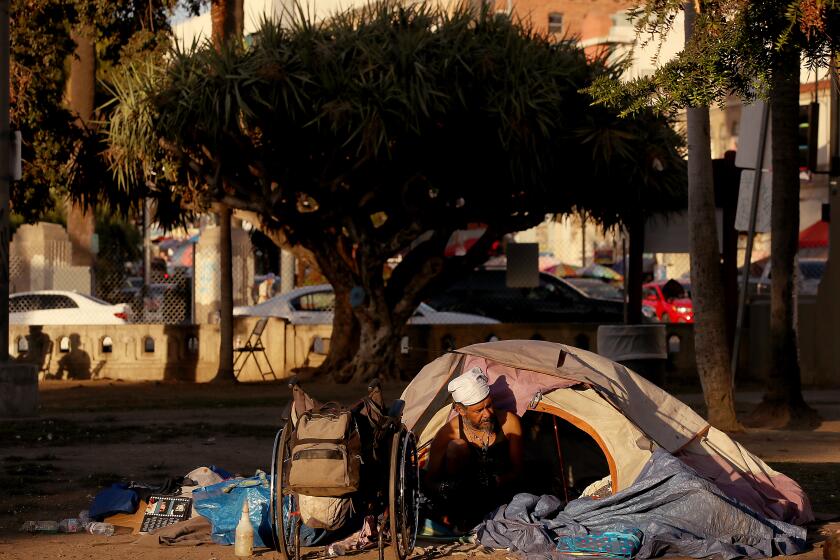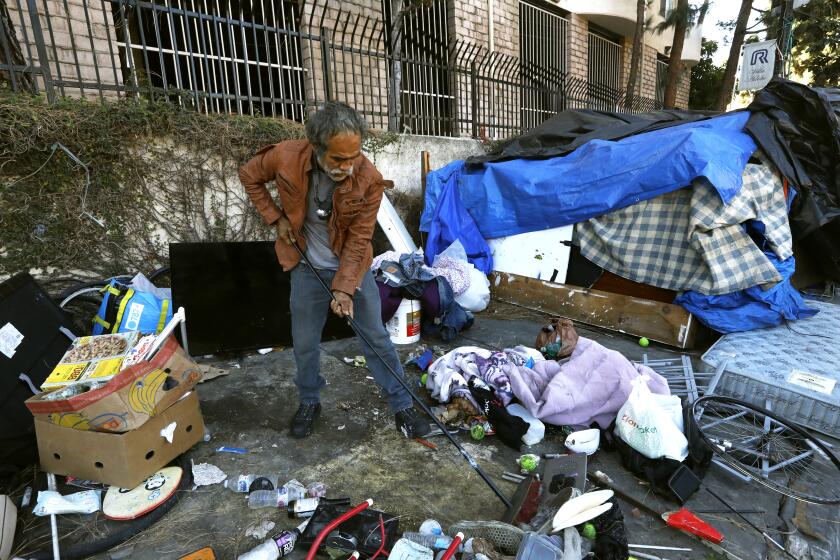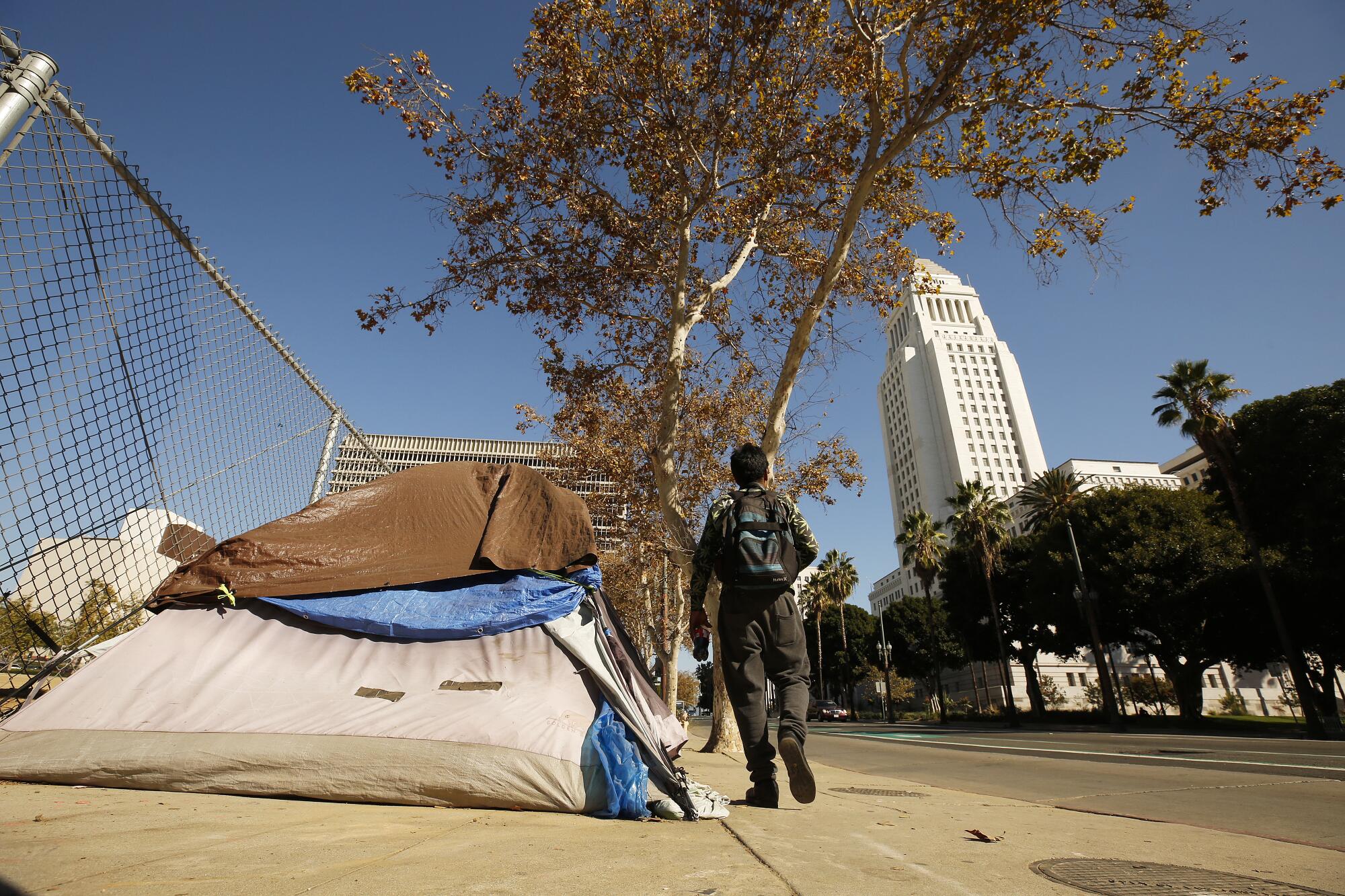
- Share via
Los Angeles County voters broadly support a legal right to shelter for all but offer tepid backing for new taxes that might pay for it, a new poll finds.
The contrast highlights a key tension in voter attitudes toward solving the region’s persistent homelessness crisis: Even as voters want to see dramatic government action to reduce the number of people sleeping in streets and parks, many doubt the capacity of the region’s leaders to get the job done.
The new poll, conducted by the Los Angeles Business Council Institute in cooperation with The Times, found that a significant majority of voters, 58%, said they believed the region can solve the problem of homelessness. By contrast, 31% said they believed homelessness would always be part of life in Los Angeles.
Even among those who expressed pessimism about solving the problem, 43% said their concern was a “lack of leadership” as opposed to 26% who said they believed there were “no realistic solutions.”
“There’s an urgent call to action for a comprehensive solution,” said Mary Leslie, president of the Los Angeles Business Council, which has pushed the city to devote more resources to renting hotels for homeless people, among other interventions.
“We need to be demanding leadership equal to the level of the crisis and emergency measures to change these conditions on our streets,” Leslie said.
A majority of voters see major institutions, including local, state and federal governments, homeowner associations and the media, more as “part of the problem” than part of the solution. Developers and real estate groups came in for particular opprobrium, with 75% of voters viewing them as part of the problem.
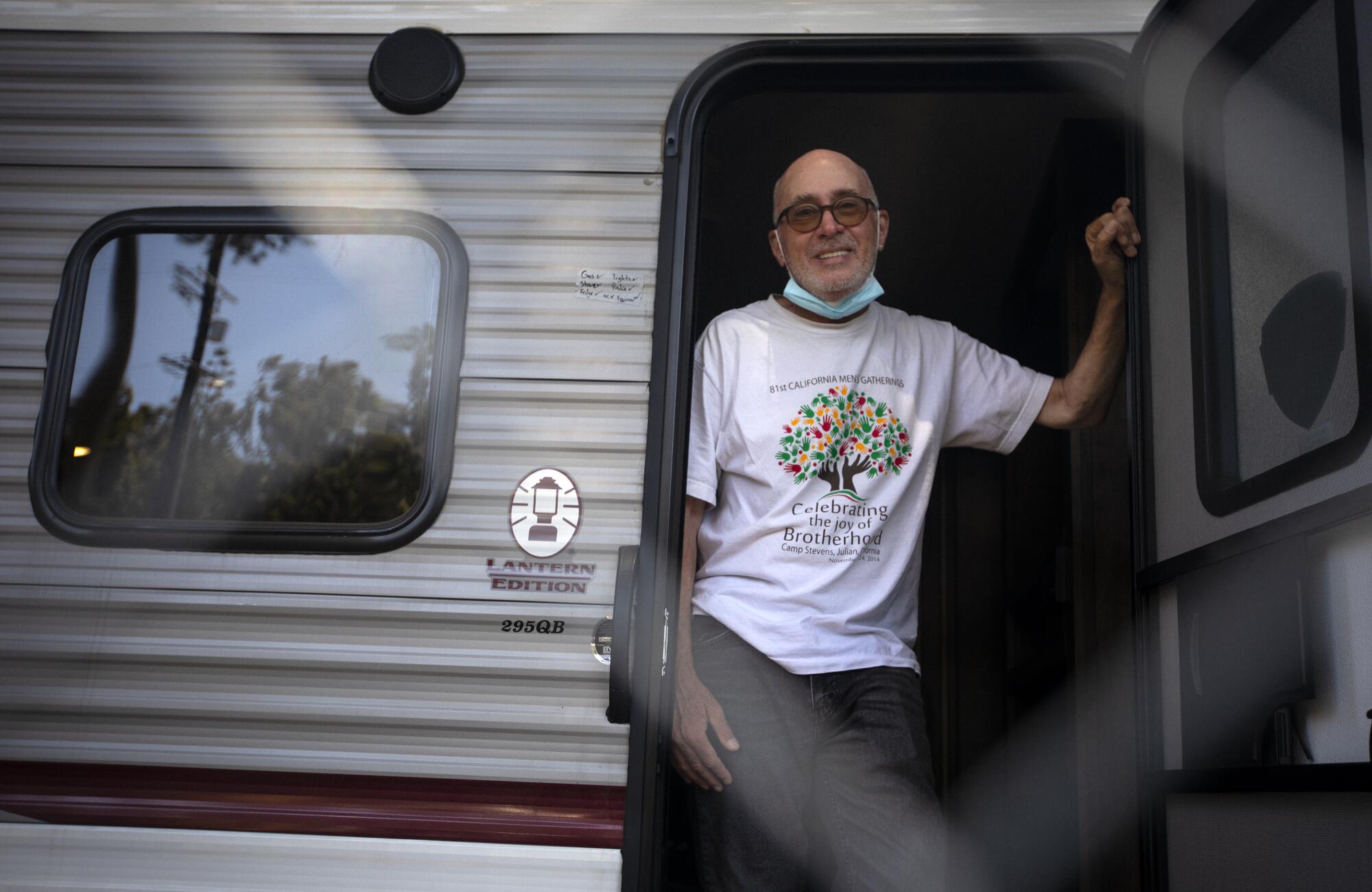
Only advocacy groups for homeless rights got an overall positive rating, with 47% seeing those organizations as part of the solution versus 39% who saw them as part of the problem.
At the same time, only 13% of voters said they knew “a lot” about what local governments have done to combat homelessness, while 40% said they knew “very little” or nothing.
The poll asked voters if they supported or opposed six specific policies that local governments have used in recent years to reduce homelessness.
The two policies that voters supported most were housing homeless people in existing buildings (81% support) and building communities of tiny homes to provide temporary housing with on-site services (80%).
About two-thirds supported temporarily renting hotels or motels to house homeless individuals.
That’s a rough description of Project Roomkey, which rented rooms for homeless people vulnerable to COVID-19, and Project Homekey, under which the county and city purchased nearly 2,000 hotel rooms for use as housing for homeless people, much of it where people stay temporarily.
Pollster Peter Hart, who helped oversee the survey, cautioned that the results should not be viewed as voter endorsements of specific policies, given the lack of information most voters have about the details of programs.
Instead, Hart said, the results offer a guide to voters’ general attitude — a preference for ideas that appear to offer quick, tangible results.
On a separate question, 46% of voters said they believed that giving incentives to developers to build more low-cost housing would be an effective way to reduce homelessness. By comparison, 22% said using tax money to build housing for the homeless would be more effective, and 13% opted for allowing developers to build more units at market rates.
Roughly 60% of voters said they viewed homelessness as an “emergency situation” requiring “major changes” in policy, compared to 27% who said the region already has the right set of policies and just needs to execute them more effectively.
“There’s a compassion in how people want to see the city and county approach this issue,” said Shakari Byerly, a pollster who has done extensive surveying about homelessness and said she expected to work with U.S. Rep. Karen Bass’ campaign for mayor of Los Angeles.
L.A. voters want the government to focus on shelter for homeless people living in the streets, even if those efforts are short term, a poll has found.
“There is a sense that nothing is being done in a strategic and coordinated way. I think that’s at the heart of the concern. People want solutions. They want clear leadership on this issue, and they don’t feel like they’ve gotten it,” Byerly said.
A legal right to shelter would be one example of a major change. More than 70% of voters said they would support such a guarantee, whether phrased as a “right to shelter,” backed by 76%, or a “right to housing,” backed by 72%. People in shelters are still considered homeless; the hope is they can stay for a relatively short time as they stabilize, get connected to services and find a permanent home.
As the number of tents and people on the street have skyrocketed, local and state officials have contemplated that idea and reckoned with what the consequences might look like. Last year, Gov. Gavin Newsom vetoed legislation creating a right to housing, saying he worried it would be too expensive.
New York adopted a legal right to shelter in the early 1980s as a result of lawsuits by advocates for homeless people. Visible street homelessness is much less common there. Critics of that policy, however, have said they do not want to adopt New York’s main solution — creating massive, often unsafe and very costly shelters where homeless people are stuck until they receive housing, which is in short supply.
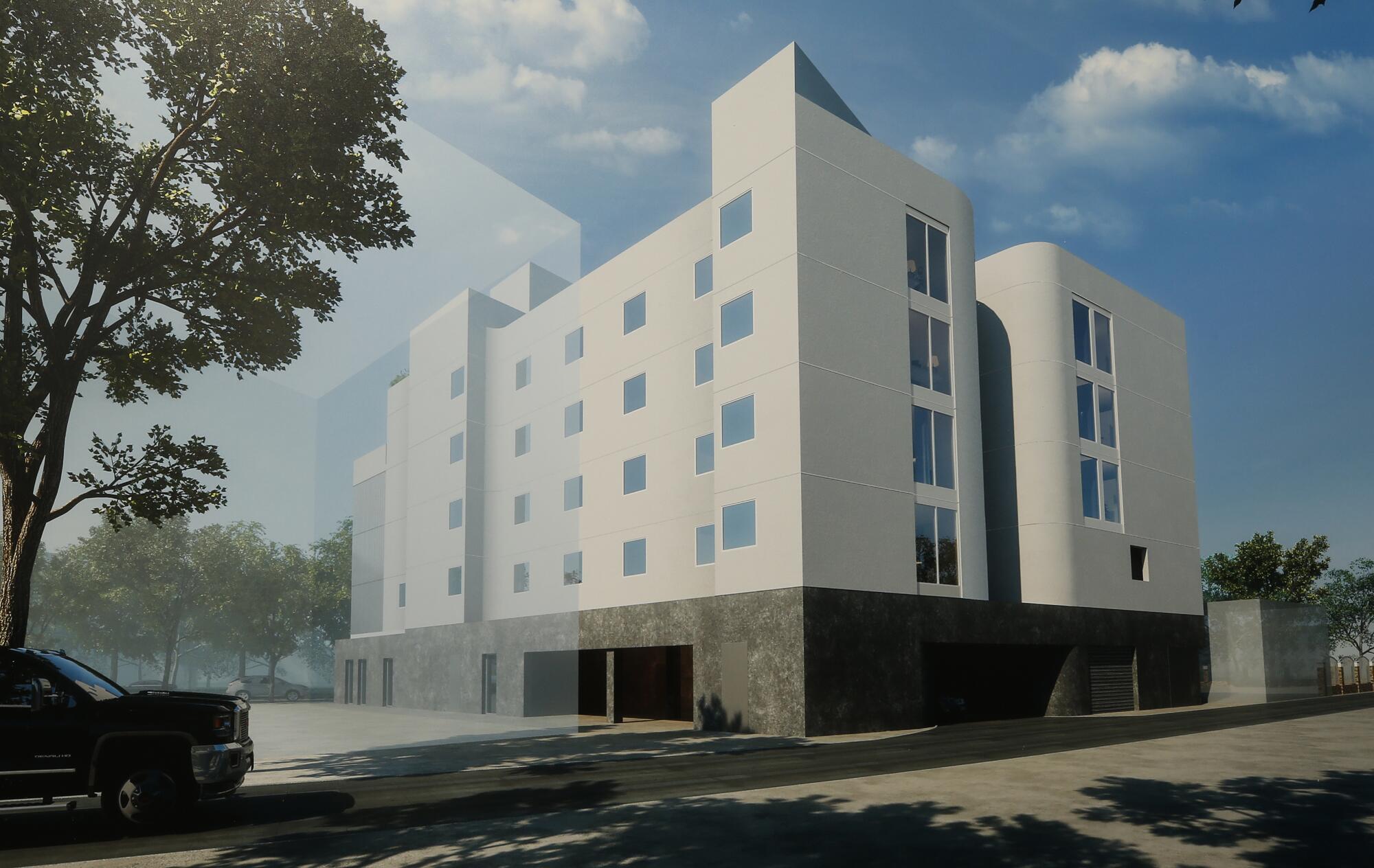
Sacramento Mayor Darrell Steinberg, who co-chaired a statewide taskforce on homelessness and has extensively studied the right to shelter issue, introduced what he is calling a “right to housing” for his city last month. Under his plan, homeless individuals would have an accompanying “obligation to accept housing.”
Despite its name, Steinberg’s proposal, if passed, would function more like a right to shelter until enough permanent housing is built.
Currently, government is “not motivated to act with greater urgency ... because housing people is not required,” he said.
In Los Angeles, Councilman Mark Ridley-Thomas last year asked the city to explore what enacting a right to housing would require. City officials are still studying the idea and have yet to report back their recommendations.
Ridley-Thomas has subsequently been suspended from his council duties after being indicted for an alleged bribery scheme. He denies wrongdoing.
Los Angeles has undertaken a major shift in its approach to homelessness, one that puts a priority on clearing unsightly street encampments.
Los Angeles Mayor Eric Garcetti said he understood why voters were attracted to the idea of housing or shelter as a right, but cautioned that the politics of such a right, as well as the details of how to accomplish it, can be difficult.
“I think it has resonance for sure,” Garcetti said. But, he added, “As people dig down on what that means, they go, ‘Whoa, like I’m a working class person, scraping together my rent, and they’re gonna get it for free,’ and then you have to convince them why that’s better than not.”
A key issue is cost. In recent years, local governments have poured billions into efforts to pull people out of encampments and prevent more people from falling into homelessness.
New taxes have subsidized much of that work. In 2017, county voters approved a quarter-cent sales tax increase to fund anti-homelessness measures for 10 years. That ushered in a new stream of spending of close to $400 million per year for a wide range of programs including more shelter beds, housing subsidies and outreach workers walking the region’s streets. Nonprofits and government agencies have used this funding to pull tens of thousands of people off the streets. Still, the expansion of encampments has made the crisis more visible.
Government officials and advocates for homeless people say more spending will be needed, but the poll indicates further tax measures could be a tough sell.
By 51% to 41%, voters said they would support a tax increase to “create permanent initiatives to help homeless individuals and reduce the homeless population.” Support increased to 63% if a tax increase included a clear plan to ensure accountability and transparency.
Registered Democrats and people who rent their homes were the most likely to support a tax increase; Republicans and homeowners were more opposed.
A recent citywide poll partially funded by the United Way found a similar level of support from voters for a tax measure.
Pollsters and political consultants said they would be leery of launching a campaign with that level of support.
Most tax ballot measures require a two-thirds vote to be approved and historically such measures lose ground over the course of a campaign.
“When I look at a number like that, it’s not bad, but it’s not a slam dunk,” said Peter Ragone, a political consultant who has worked for Newsom and has been advising Rick Caruso as he mulls running for mayor of Los Angeles. “When you look at ballot measures, you need high numbers, because the measures are susceptible to negative information from opponents.”
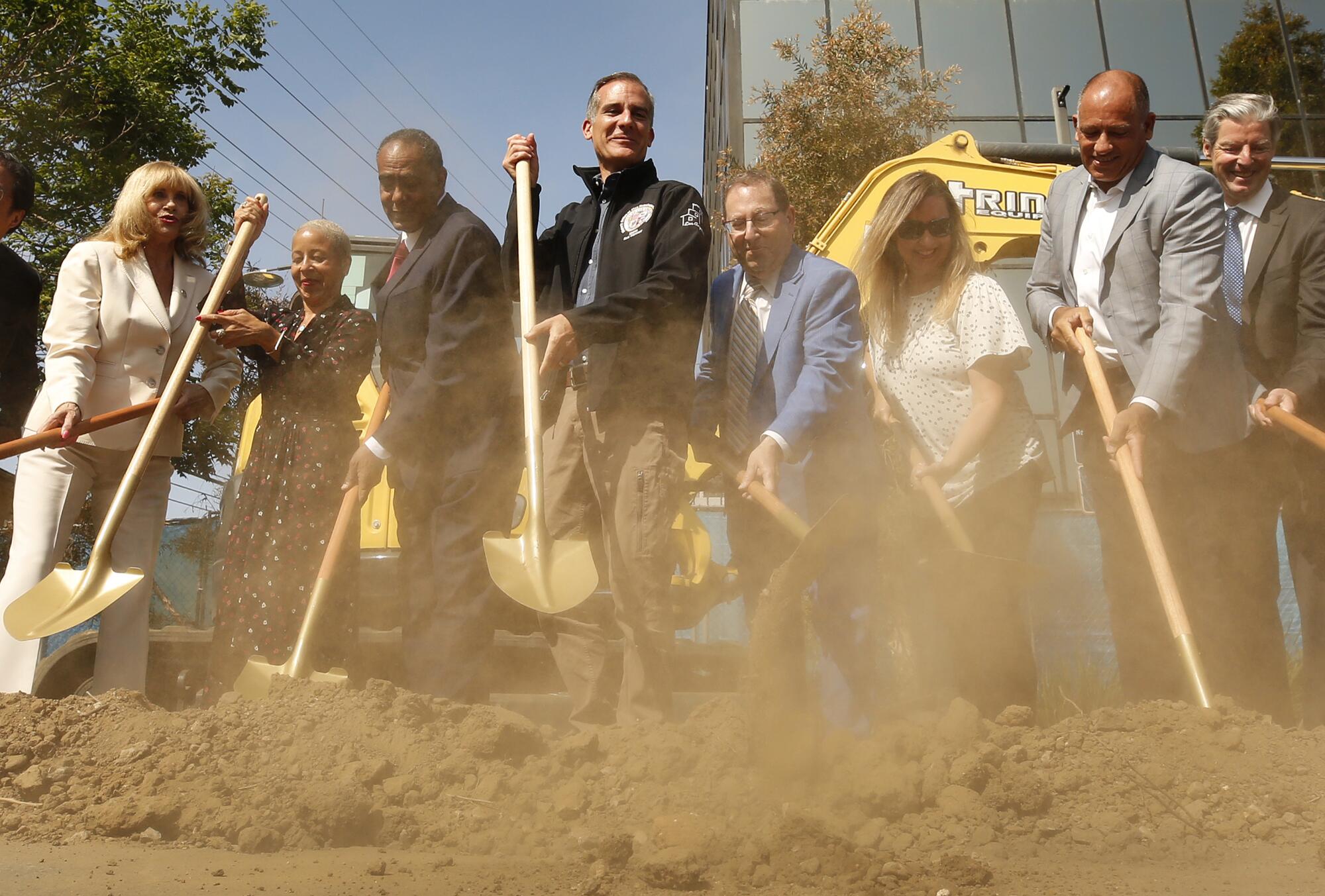
A majority of members of the Los Angeles County Board of Supervisors told The Times that despite their misgivings about how the homelessness response is working, they still wanted to see the sales tax, Measure H, renewed when it expires in the next few years. They did not back the idea of any new, additional tax.
“I do support renewing Measure H, but we will have a lot of work to do to make the case to the voters,” said Supervisor Janice Hahn, who was a major booster of the measure’s passage.
“We all know that the homelessness crisis is not going to be over in the next five years, and we need to show voters we have spent this money effectively,” she added.
Supervisor Kathryn Barger, the board’s only Republican member, indicated more opposition.
“The cities that I represent tell me that they are consistently not getting the resources that they need to implement their locally developed solutions,” Barger said in a written statement, reflecting the complaints of some local officials that too much of the money from Measure H has gone to the city of Los Angeles.
The Los Angeles Business Council Institute conducted a survey in cooperation with The Times from Oct. 27 to Nov. 3 to examine Angelenos’ views on homelessness. Questions were posed by telephone and via the internet to 906 Los Angeles County voters. This week, The Times is publishing a series of stories on the poll results.
“So, something isn’t working,” she wrote. “I would be hard pressed to ask voters to approve Measure H again, and I can’t envision supporting a new tax measure.”
Garcetti, whose tenure concludes in 2022, promised during his first campaign, in 2013, to end chronic homelessness.
After eight years in office, he offered a more sobering note. A decade from now, he said, homelessness potentially could be eliminated, but only if both the federal and state governments made even larger investments to help the city and county address income inequality, create more affordable housing and expand mental healthcare.
Absent that unlikely scenario, he said, the region potentially could cut homelessness in half in 10 years, but that “will require 10 years of everybody saying yes to housing and density. Yes to this fight. Yes to funding this fight. And yes to the street strategies with the mental health services around them.”
“Short of that,” he said, “you’re treading water.”
More to Read
Sign up for Essential California
The most important California stories and recommendations in your inbox every morning.
You may occasionally receive promotional content from the Los Angeles Times.
